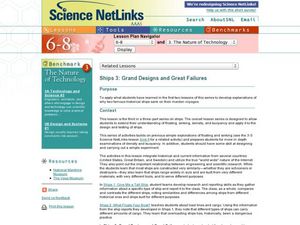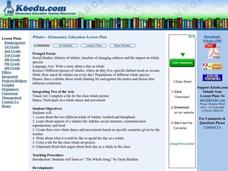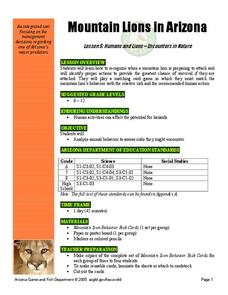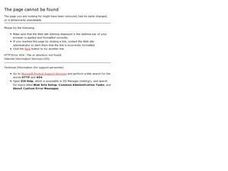Curated OER
Endeavor: Preparing Ourselves for Future Destinations
Middle schoolers define the word endeavor and then practice the art of self-discipline. They create character trait charts and discuss how strong character traits help students meet their future destinations.
Curated OER
Legends of the Fifth
Students explore the the legends and myths of the Orient, Africa, Europe, Asia, and the Americas in this six lessons unit. Different cultures and belief systems of the inhabitants of these areas are examined through storytelling techniques.
Curated OER
New Year Celebrations Around the Globe
Students view art images of Norman Rockwell's family traditions and celebrations. They search the internet for information, and complete reflective and creative writing and sketch assignments. Students recognize and name emotions shown...
Curated OER
Making Good Decisions
Students discuss consequences and trade-offs to different scenarios. In this investigative lesson students learn about compromise and discuss possible options and consequences to certain situations.
Curated OER
The Impact of Invention
Students explore the impact of invention. In this invention lesson, students examine how inventions are on going and affect all aspects of life in both good and bad ways. Students will research the history of invention, become an...
Curated OER
A Bight is Born
Pupils sequence and model the events leading to the formation of the southeastern coast of the United States, including the formation of the South Atlantic Bight.
Curated OER
Gila Monsters Meet You at the Airport
Second graders listen to "Gila Monsters Meet You At the Airport" and complete venn diagrams of geographical areas.
Curated OER
It's About Time
Students in a kindergarten class are introduced to the concept of time. Individually, they compare the current year to their birth year to discover their age. As a class, they practice reading a digital and analog clock and create their...
Curated OER
Whales
Students study the history of whales. In this whale lesson plan, students research two types of whales, color a tile, and write a one page paper. The tiles may be combined to make a group picture.
Curated OER
Can Young Children Distinguish Between Living and Non-living Things?
What does it mean to be living? Help your young scientists identify living and non-living things as a result of their learning through discovery. Observation of and interaction with a set of natural phenomena in their community will make...
Curated OER
The Origin of Life
In this origin of life worksheet, pupils write answers to five questions. They describe characteristics of the first life forms and how scientists believe oxygen accumulated in the Earth's atmosphere.
Curated OER
Mountain Lions in Arizona Lesson 5: Humans and Lions - Encounters in Nature
Fledgling felinologists are taught how to recognize when a mountain lion is preparing to attack. They identify proper actions to provide the greatest chance of survival if they are attacked. Learners play a matching card game in which...
Curated OER
Weather Patterns
Students research to determine weather patterns and natural hazards most likely to affect their region.
Curated OER
Farmers - Caretakers of the Land
Students explore resource management, specifically farming. After reviewing vocabulary words, groups of students explore what is conserved by each practice. They compare and contrast responses. Students describe farming procedures which...
Curated OER
Recycling-Taking it Easy on the Environment
Learners review the garbage/landfill graphs included with the lesson. They discuss the information on the graphs and discuss which garbage products come from their homes. Students collect examples of over packaging to share with class...
Curated OER
Using Photovoltaic Cells and Systems
This interesting document suggests nine different activities for shedding light on photovoltaic cells. A bit of background information is furnished for you, as well as many, many resource links. Listed for each activity are a learning...
Curated OER
Bioethics and the HGP
Young scholars analyze case studies using the rules and principles of ethics. They comprehend which rules and principles of theics are of great importance to the Human Genome Project. Students participate in mock student hearings.
Curated OER
Wisconsin Snapshots
Fourth graders study Wisconsin's culture and heritage. They research the state's symbols and identify leaves common to the Wisconsin area. They create a leaf booklet and visit the state park. They visit local farms and create nature maps...
Curated OER
The Nesting Habits of Folders
Students create an organized web of nested grade level folers. Within each grade level folder, they create a Language Arts/Social Studies folder and a Math/Science folder. All folders be color coded.
Curated OER
Back to School with Paper Quilts and Partnerships
Make a commitment to collaboration, and build classroom community by integrating art and classroom objectives to create a paper quilt.
Curated OER
History in the Making: The Tortilla
Fourth graders examine the history of the tortilla and extend the study across the curriculum. In this history of the tortilla lesson, 4th graders research the background of the tortilla, determine the ingredients, and work with the...
Curated OER
Michael Jackson Lessons: A Cross-Curricular Experience
By learning about Michael Jackson through these lesson plans, students can explore history, science, math, etc . . .
Curated OER
Water Filtration
In this water pollution and filtration lesson plan, 5th graders read the story 'Saving Salila's Turtle' and discuss the impact pollution has had on the Ganges river. Students work in groups to brainstorm different types of water...
Curated OER
Medieval and Renaissance Art: Botanical Symbolism
Students study the significance of flowers in art from two periods. In this Medieval and Renaissance art lesson, students research the presence and meaning of botanical illustrations in twelfth, thirtieth, and fourteenth century...























